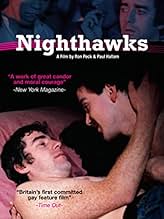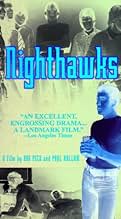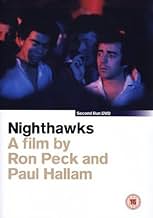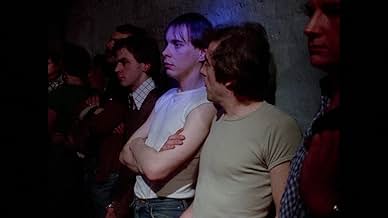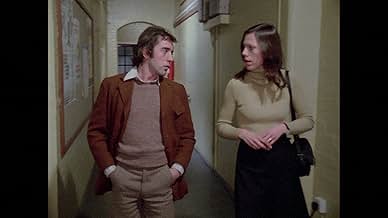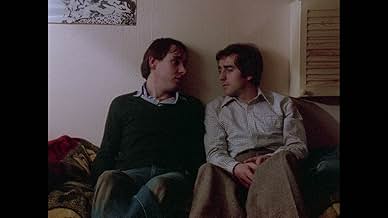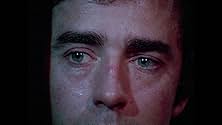Ajouter une intrigue dans votre langueA homosexual man is forced to hide his sexuality by day while living his secret life by night.A homosexual man is forced to hide his sexuality by day while living his secret life by night.A homosexual man is forced to hide his sexuality by day while living his secret life by night.
- Réalisation
- Scénario
- Casting principal
- Récompenses
- 2 nominations au total
Stuart Turton
- Neal
- (as Stuart Craig Turton)
Avis à la une
Nighthawks is an interesting study of gay life in London and at the time it was made it was those heady 70s, post liberation and pre-AIDS. This kind of film was not made again so soon either here or across the pond where Nighthawks originated.
This is a study of Kenneth Robertson who is a young geography teacher at one of London's inner city schools by day and by night he's living the life of a gay man whose only venue is the bar scene. We see him picking up a lot of men, but it's only a series of one night stands. Neither Robertson or Diane Keaton is destined to find Mr. Goodbar to spend a life with.
The climax of the film is when his students find out about him and confront him in class. He answers a lot of their questions, their most ignorant questions since these are kids who have not exactly been exposed to positive gay role models. Since then a lot of positive LGBT characters have been on the big screen, the small screen, and a ton of well known people in all walks of life have left the closet behind. And not for a hedonistic existence that Robertson enjoys.
Many films like Nighthawks fall into a category like this. Stonewall has come, liberation has come, we'll get our rights, but let the good times roll. That's the attitude that dates Nighthawks now.
Still it makes an interesting view of the times.
This is a study of Kenneth Robertson who is a young geography teacher at one of London's inner city schools by day and by night he's living the life of a gay man whose only venue is the bar scene. We see him picking up a lot of men, but it's only a series of one night stands. Neither Robertson or Diane Keaton is destined to find Mr. Goodbar to spend a life with.
The climax of the film is when his students find out about him and confront him in class. He answers a lot of their questions, their most ignorant questions since these are kids who have not exactly been exposed to positive gay role models. Since then a lot of positive LGBT characters have been on the big screen, the small screen, and a ton of well known people in all walks of life have left the closet behind. And not for a hedonistic existence that Robertson enjoys.
Many films like Nighthawks fall into a category like this. Stonewall has come, liberation has come, we'll get our rights, but let the good times roll. That's the attitude that dates Nighthawks now.
Still it makes an interesting view of the times.
I know this is the wrong credit for kris Watson Cos I am Kris Watson and I can 100% tell you I wasn't in it.
This could almost be a documentary, it's depiction of the gay male lifestyle is so realistic. A brilliant film unlike any others in the genre. No fantasies here, just honesty (though obviously made before AIDS was an all-too common fear).
The problem with this look at late 70's British gay lifestyle, is that it is a little too realistic to carry off with any sort of interest. Like most stories about people on the hunt for romance/sex etc., it is incredibly introspective. Ken Robertson is a really quite dull, full of himself "Jim" - a teacher by day who looks for love in gay pubs/clubs at night. He picks up an array of folks, sometimes he has sex, sometimes not.... same old, same old... (regardless of your sexuality). If it weren't for the fact that it was set just before the dawn of Mrs. Thatcher's Clause 28 Britain, which at the time of course, this Ron Peck story would not have been able to anticipate - it would constitute little more than a melodrama with some very dodgy music and lacklustre tales of one night stands... As a semi-anthropological study of a gay man in London it is vaguely interesting, but any claims it may make to take a deeper look at the sociological themes of the time, or of attitudes are just bridges too far. It does have quite a telling Q&A style discourse at the end that illustrates the stereotypical attitudes of teenage kids that could have been made much more of, had the film itself not focused so much on the rather dreary existence of the subject.
The main character's life (Jim) is teaching during the day and dancing and picking up partners at the discos. And this process is shown over and over again, ad nauseum, with the discos playing one of literally four very repetitive songs in every scene.
This film desperately needed an editor. It's a 20-minute film that goes on for an hour and 50 minutes. There's literally just 15 minutes of consequential footage in it, and I've never seen so much disco dancing footage in a single film in my life. Even Saturday Night Fever didn't have this much.
There's one shot of Jim scanning the crowd while he drinks his beer, and the shot just goes on for literally 5 minutes of him staring and pretending to drink from an empty glass with his eyeballs zipping around as the camera slowly zooms in. I could almost imagine it being a Python sketch where satirical subtitles appear, saying, "Okay, you can cut now." "No, seriously, cut." "Okay, cut, please." "Will you please stop drinking from an empty glass?" "No, seriously, there's no more beer in there." "You're literally licking the glass clean now." "Okay, CUT!"
Yes, I appreciate the film as a time capsule and for its honesty and cinema verité style, but it's a film that doesn't know when to quit for lack of interesting material. The only consequential moment is the scene in which he answers questions about his homosexuality for his students.
This film desperately needed an editor. It's a 20-minute film that goes on for an hour and 50 minutes. There's literally just 15 minutes of consequential footage in it, and I've never seen so much disco dancing footage in a single film in my life. Even Saturday Night Fever didn't have this much.
There's one shot of Jim scanning the crowd while he drinks his beer, and the shot just goes on for literally 5 minutes of him staring and pretending to drink from an empty glass with his eyeballs zipping around as the camera slowly zooms in. I could almost imagine it being a Python sketch where satirical subtitles appear, saying, "Okay, you can cut now." "No, seriously, cut." "Okay, cut, please." "Will you please stop drinking from an empty glass?" "No, seriously, there's no more beer in there." "You're literally licking the glass clean now." "Okay, CUT!"
Yes, I appreciate the film as a time capsule and for its honesty and cinema verité style, but it's a film that doesn't know when to quit for lack of interesting material. The only consequential moment is the scene in which he answers questions about his homosexuality for his students.
Le saviez-vous
- AnecdotesWidely considered the first "commercial" or "commercially released" gay feature film ever made in the U.K., where the story was directly about gay relationships and themes, but which was not about crime (blackmail or murder), or purely stereotypical.
- Crédits fousThis film was made possible by a number of individuals and organisations.
- ConnexionsFeatured in Strip Jack Naked (1991)
- Bandes originalesSo Long
Lyrics by Stuart Turton (as Stuart Craig Turton)
Sung by Pinky Steede
Recording engineer Gwyn Mathias
Meilleurs choix
Connectez-vous pour évaluer et suivre la liste de favoris afin de recevoir des recommandations personnalisées
- How long is Nighthawks?Alimenté par Alexa
Détails
- Date de sortie
- Pays d’origine
- Langue
- Aussi connu sous le nom de
- Cités de la nuit
- Lieux de tournage
- Sociétés de production
- Voir plus de crédits d'entreprise sur IMDbPro
- Durée1 heure 53 minutes
- Mixage
- Rapport de forme
- 1.37 : 1
Contribuer à cette page
Suggérer une modification ou ajouter du contenu manquant

Lacune principale
By what name was Nighthawks (1978) officially released in India in English?
Répondre
